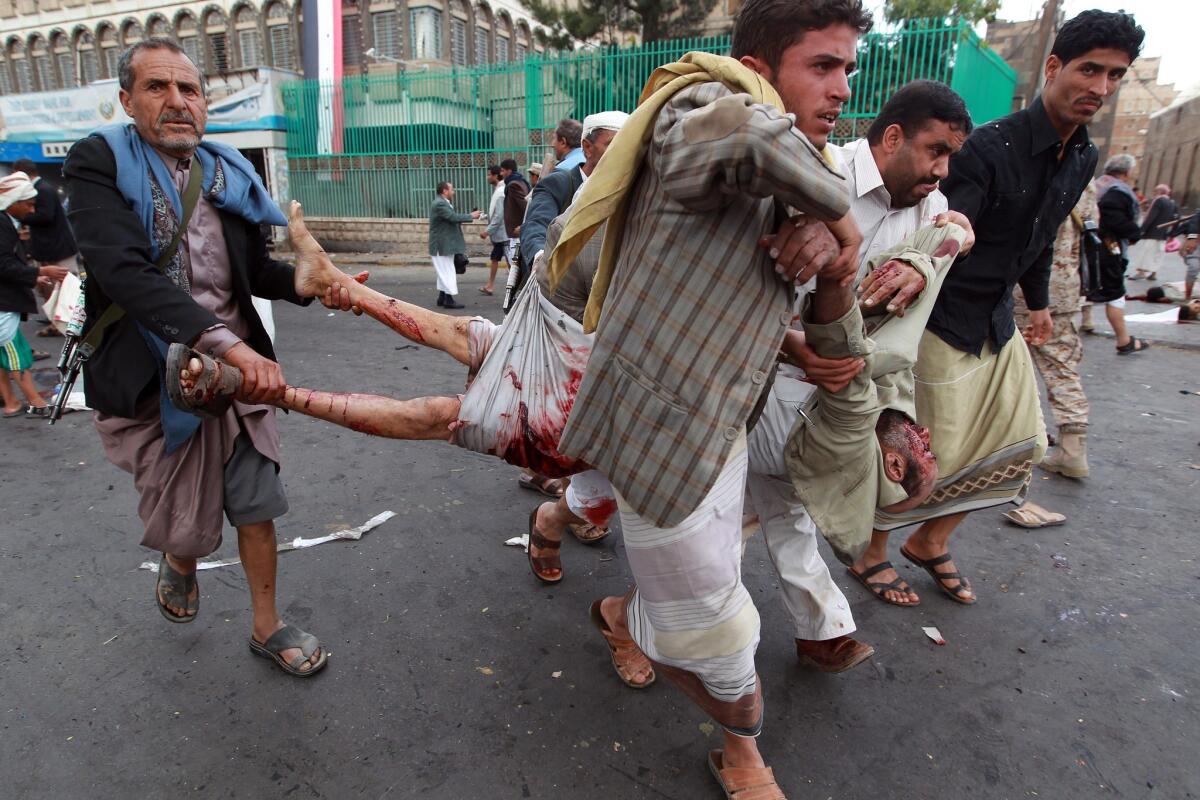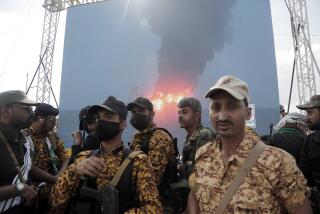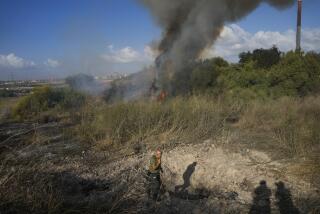Yemen bombings kill nearly 70; Al Qaeda suspected

Two suicide bombers spearheaded attacks in Yemen on Thursday that left nearly 70 people dead, including 19 soldiers, as factional violence continued to batter the weakened government.
The deadliest of the two attacks targeted a gathering of Shiite Houthi rebels in the capital, Sana. As hundreds crowded into the central Tahrir Street to protest the nomination of a new prime minister, a man described as being about 20 years old blew himself up while being searched by security officials at the entrance to the protest area.
The blast, at about 9 a.m., killed at least 49 people, including four children, and injured about 140 others, 70 critically, the Health Ministry said.
The second attack took place in the southern port city of Mukalla in Hadarmout province, where a car exploded at an army checkpoint. Immediately after, authorities said, armed members of Al Qaeda in the Arabian Peninsula assaulted the checkpoint. The double-edged attack left 20 soldiers dead and 13 injured, officials said.
No group immediately claimed responsibility for either attack, but the Al Qaeda group was widely suspected in both. Al Qaeda in the Arabian Peninsula, one of the most potent affiliates of the Sunni Muslim militant group, has been pushing back against gains from the Houthis, who are Shiite. Both oppose the government.
AQAP, as it is called, is especially strong in Hadarmout province.
It has been joined in its offensive by the offshoot Anshar al Sharia. Together, the groups have targeted a number of Houthi gatherings in recent weeks, killing more than 60 people before Thursday’s attacks.
The Houthis have been waging an effective insurgency against the Yemeni government, and on Sept. 21 gained control over vital government institutions and state buildings in Sana. A U.N.-brokered peace deal brought an end to the violence, and in an agreement with President Abd Rabbo Mansour Hadi, the Houthis agreed to withdraw their forces from the capital if they were included in a new Cabinet.
However, they strongly opposed Hadi’s nomination of Ahmed Awad bin Mubarak as the new prime minister, charging that U.S. influence led to the choice. In a speech Wednesday, Houthi leader Abdel-Malik al-Houthi called Hadi “a puppet” of foreign powers.
Mubarak asked Hadi early Thursday to withdraw his name from consideration.
A Houthi spokesman, Mohammed Abdulsalam, also accused unidentified foreign powers of being behind the bombing in Sana.
“The criminal attack that targeted the gathering of revolutionaries and people of Yemen in Tahrir confirms the size of the foreign conspiracy against Yemen,” he said, adding that “foreign powers do not want to see Yemen independent.”
The United States has carried out numerous drone attacks on Al Qaeda in the Arabian Peninsula with the apparent consent of the Yemeni government.
According to the Associated Press, the dead and wounded in Sana were taken to three hospitals. At one, Al-Moayed hospital, victims’ body parts were piled up on the hospital floor, and two severed heads were placed next to two headless bodies. At least six children were listed in critical condition.
Special correspondent Ali reported from Sana and Hassan from Cairo
More to Read
Sign up for Essential California
The most important California stories and recommendations in your inbox every morning.
You may occasionally receive promotional content from the Los Angeles Times.










